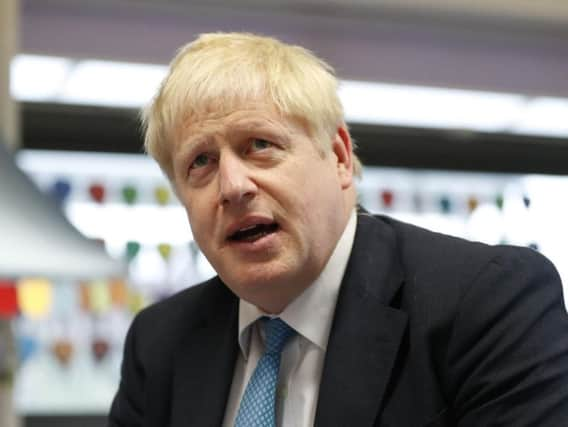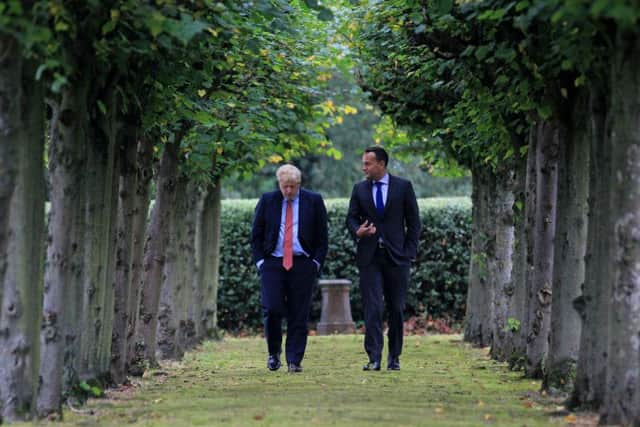Direction of Brexit will accelerate calls for united Ireland - David Blunkett


Their reluctance springs from the perversity of the situation. The Government’s supposed programme for the next session of Parliament, to be outlined in the Queen’s speech on Monday, but with an unusual twist. Whereas historically this formal ceremony would follow a General Election, this time it is expected to precede one.
Whether the Government can win the vote on the Queen’s Speech depends on the 21 Conservatives who had the Whip withdrawn and were effectively expelled from the Conservative Party. Some are keen to get back in and some – like Rory Stewart and Dominic Grieve – have burnt their boats.
Advertisement
Hide AdAdvertisement
Hide AdIf the Queen’s Speech is defeated, would Boris Johnson resign as PM, potentially therefore forcing the Opposition parties to come clean on whether they really could present a candidate acceptable to all of them in order to have a chance of forming an interim government?


We must understand risks and reality of Northern Ireland border and Brexit backstop – Yorkshire Post lettersThat is, of course, if Boris hasn’t, by some miracle, pulled the rabbit out of the hat and agreed a deal – a pathway, in the latest jargon. Next week, when the European Council meets, diplomacy will have to replace crude bombast if there’s to be any movement.
If a deal is reached, it’s hard to see how Jeremy Corbyn could block a General Election that, on present polling, would result in a meltdown for the Labour Party, and a majority Boris Johnson Government. If the UK is out, with or without a deal, then of course Nigel Farage and the Brexit Party fall away.
That is crucial to the Conservatives’ chances of achieving a majority government, whilst at the same time shooting the Liberal Democrat fox, because, of course, you can’t stay in the European Union if you’ve already left.
Advertisement
Hide AdAdvertisement
Hide AdThere are so many ifs and buts at the moment that anyone who claims they know the likely outcome of events in the next two weeks probably needs to lie down in a darkened room.
It’s worth reminding ourselves, however, that we are talking about the transitional arrangements. You’d think with all the arguments about whether or not Northern Ireland should remain in the Customs Union that this was such a make or break moment.
It’s not the case, however, that future arrangements between the EU and UK cannot conclude in a sophisticated, longer-term solution.
Yorkshire MP Julian Smith named Northern Ireland Secretary as Boris Johnson carries out brutal Cabinet cullWith 15 months to go before the December 2020 deadline when the transitional period runs out, common sense can prevail. This seems to be forgotten in all the dialogue that is taking place at the moment, hence the ability of the Prime Minister and those around him to be able to play what is now being called the ‘blame game’.
Advertisement
Hide AdAdvertisement
Hide AdJust to remind ourselves: the so-called backstop was supposed to be a time-limited arrangement which would allow Northern Ireland a special status in relation to both trading and, therefore, customs arrangements with the Republic and, of course, allow time to find alternatives to a ‘hard border’ in the long term.
If you’re bewildered, so am I. I’m beginning to wonder whether I’m losing my marbles. But I think it goes something like this: the Government are prepared to have a temporary arrangement that would have ‘alignment’ with the Single Market for goods. This would result in two borders rather than one.
A border across the Irish Sea between Britain and Northern Ireland, and of course a border between the North and South. But because the Government won’t agree to the EU proposition that Northern Ireland should stay within the Customs Union, customs arrangements would have to be put in place between the two halves of the island of Ireland. Still with me?
The trick, it seems to me, is to work out why, having agreed a convoluted formula in relation to goods under the Single Market, it’s not beyond the wit of either woman or man to be able to do so in relation to customs.
Advertisement
Hide AdAdvertisement
Hide AdFrom the Government’s point of view, they want to retain control of the timetable and of course the ability in the medium term to undertake new trade arrangements outside the EU, with the rest of the world.
Part of the UK being in the Customs Union makes this problematic, but more importantly, from the point of view of their allies, the Democratic Unionist Party don’t want anything that looks like separating Northern Ireland from the rest of the UK.
Ironically, the way that this is all moving, will probably accelerate to a much earlier referendum in the North on unification of Ireland, something the DUP believe would be the outcome of an ‘all Ireland’ Customs Union.
Last month in this column, I recalled the role of the Lord Protectorate, when Oliver Cromwell, having gained his power and authority from Parliament, then dismissed it in favour of direct rule. Part of his motivation was the reluctance of Parliament to grant him the funds he believed were needed to crush rebellion in, guess where? Yes, Ireland.
Advertisement
Hide AdAdvertisement
Hide AdTaking Britain over the cliff edge with no-deal Brexit is not acceptable when livelihoods are at risk - Yorkshire Post lettersIn the intervening centuries, it would seem we have learnt little. What we do know, however, is that in our country, we have a parliamentary, and not presidential, democracy.
The Prime Minister gains his authority, and his position as Prime Minister, from Parliament. That is why, whatever happens in the weeks ahead, the idea that our public debate should rest on ‘Parliament versus the people’ flies in the face of every tenet of our representative democracy.
One part of the establishment, setting the people against another part of the ‘establishment’ and doing so for party political and not for national advantage. Surely if there was ever a time for cool heads, reflective and sensible dialogue, and yes, final compromises on all sides, that time is now.